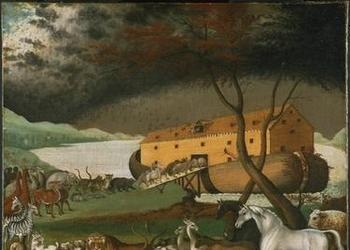Confusion Over Noah

Recently I watched a television program titled The Mysteries of Noah’s Flood, on The Learning Channel. I excitedly looked forward to viewing it since I usually enjoy their programs. But this time was different. This time they let me down with their conclusions.
The show was centered on if, where and how the story of Noah evolved and if it was even true. Throughout the program, they spoke with those who are sure of the ark’s reality. They also, of course, spoke with those who were sure it was no more than a tall tale.
At one point, the discussion turned to various tablets uncovered in different areas of Mesopotamia. The tablets tell the story of a man who built an ark, collected animals before a flood that took the lives of the world and also released birds. One story claimed the flood came because the people had gotten too noisy.
The tablets found were scientifically dated and the results proved the tablets were written long before the biblical account. They concluded that either the biblical account of Noah was created from the hearing of these stories while the Israelites passed through these areas and mingled with the local people, or the story was learned by Israelite leaders and used to keep the people in fear of their God.
In their view, no flood occurred. The program’s speakers repeatedly referred to Noah and the ark as a myth. They stated no scientific proof exists that a flood of this magnitude ever occurred and that any major flood would have seemed an act of God to the people of that time.
What bothered me the most was the perception they left with the viewers—that they had proven (though this was never directly stated) that there was no way the Bible’s story of Noah could be true. They based all this on the finding of those tablets.
I waited and waited for them to mention the third possibility they should have recognized: The Flood stories found written on tablets were, in fact, based on the same story of Noah. Yes, the names may have been changed and, yes, the tablets may have been older than the biblical writing, but any child who has played the game of “telephone” can tell you how different versions of the same story can arise.
Too often in this world people fall away from faith and require undeniable physical evidence of a thing to believe in it. Without such proof, they seek to undermine the facts in any way they can. Anything they find that would back up the truth, they will turn around and use to discredit the facts instead.
Two scripture passages came to mind after watching the program. The first is Proverbs 3:5-6. “Trust in the LORD with all your heart, and lean not on your own understanding; in all your ways acknowledge Him, and He shall direct your paths.” The word “direct” in Hebrew is yashar, which means “to make smooth, straight, or right.” In other words, we should rely upon God to guide us in the right direction, instead of relying on our own human understanding.
The other passage is 2 Timothy 3:16-17. “All Scripture is given by inspiration of God, and is profitable for doctrine, for reproof, for correction, for instruction in righteousness, that the man of God may be complete, thoroughly equipped for every good work.” In order for the educated people on this program to believe the “myth” of Noah and the ark, they would have to admit so many other truths from God’s Word. They were not prepared to do this.
We must learn to have faith in what God has done and will do in the lives of mankind. God provided us His Word to base our lives on. He produces miracles, and we must believe in those miracles. He is the same yesterday, today and forever (Hebrews 13:8).
It never occurred to those educated people that the Flood story was told and retold throughout the generations following the Flood. Those who were not followers of God would, of course, enhance it as time went on. Their agendas or memories were changing and they would have easily changed the minor details to suit their needs. To me it was so obvious! Of course, the stories found written on the tablets and in the Bible are close in detail—they are indeed the same story, the historic accounts of Noah and the ark.
Recommended Reading
For more information on the subject of Noah, read the following Good News articles: “Noah’s Flood: Did It Really Happen?”, “Serious Problems With Dating Methods” and “Did the Noachian Flood Cause Global Catastrophe?”.
Since the time of Noah has many parallels to the end time, you may also be interested in reading our free booklet Are We Living in the Time of the End?
